The Cramer Quartet Presents Haydn: Dialogues + UCC Harlo
Chelsea
Thu, December 7, 2023, at 7:00 PM,
EST
-

- Bring your own drinks
- Alcoholic and non-alcoholic drinks provided
-
Wheelchair access
- Wheelchair Accessible
-
- Kid-friendly event
This is a Groupmuse Massivemuse
Epic performances in unexpected spaces.
Hosts
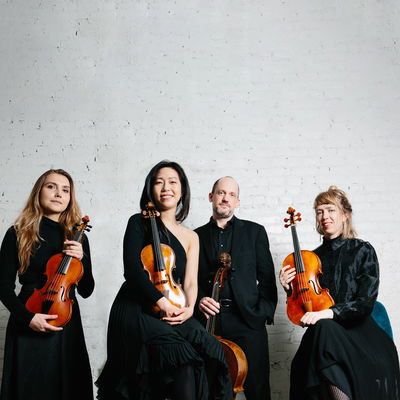
Groupmuse is very excited to feature, for the very first time on our Massivemuse series, the Cramer Quartet 🎻, a period instrument string quartet that combines the world of historically informed performance with newly commissioned works exploring and expanding the sound world of gut strings!
Join us at Alchemical Studios for the latest chapter of Haydn: Dialogues, CQ's multi-year cycle combining Joseph Haydn’s 68 string quartets with sixteen new companion commissions. On Thursday, December 7th, at 7:00pm, the quartet will perform Haydn String Quartet Op. 71 No. 2, inti figgis-vizueta's mesmerizing 30 mengstraße, and a DJ set by the brilliant UCC Harlo (violist Annie Garlid). Check out UCC Harlo's Ceres on Youtube!
🎟️ Doors Open: 7:00pm
🎶 Concert: 7:30pm
🍶 Tickets include a glass of wine selected by Blue Hill Wine Shop or makgeolli, a Korean unfiltered rice beer donated by Màkku!
📷 Tatiana Daubek, Ruvan Wijesooriya, ella joklik (and illustration)
What's the music?
Program:
Franz Joseph Haydn - String Quartet in D Major, Op. 71, No. 2
Adagio; Allegro
Adagio cantabile
Menuetto. Allegretto
Finale. Allegretto
inti figgis-vizueta - 30 mengstraße (NY Premiere)
UCC Harlo - selections from United and Topos plus unreleased music
This project is made possible by the Lower Manhattan Cultural Council in part with funds from Creative Engagement or Creative Learning, a regrant program supported by the funding agencies The New York City Department of Cultural Affairs (DCLA) in partnership with the City Council. LMCC serves, connects, and makes space for artists and community.
Where does this music come from?
Franz Joseph Haydn’s String Quartets, Opus 71, were published in 1793: 32 years before the first railway, 84 years before the invention of the phonograph, and 190 years before the birth of the internet. People, music, and information moved about so differently, so that today we are left only with ink-on-paper and the instruments of the time to piece together how this music would have sounded.
This is why we play on period instruments – with strings made of gut, with lighter bows, and without the “modern conveniences” of end-pins and shoulder rests – and why we learn from first-hand sources, all in the pursuit of bringing this music to life, to play it and hear it as though it were hot off the presses.
As early musicians, we explore music as it was performed during its own time. The instruments we play are set up in a style similar to Haydn’s time. We look at first-hand sources like manuscripts for clues and insights a particular composition. We delve into common stylistic practices of the day to get a better sense of the musical context surrounding a work.
Our goal, though, isn’t so much to recreate or reenact this music as it is to engage with it as a living, breathing entity, and so we also seek out influences and music that is truly fresh, turning to the composers of today to provide commentary and contrast, and thereby context. Our Haydn: Dialogues project was born from that stance, with the goal of pairing Haydn’s 68 string quartets with music by 16 living composers, asking each to write a new work in response to one of Haydn’s string quartet opuses.
inti figgis-vizueta's string quartet 30 mengstraße was written in response to Haydn's Opus 71 and is inspired both by its classical structures and the beautiful and unusual architecture of the buildings on Mengstraße in Lübeck, Germany. These buildings showcase the techniques of Backsteingiebel, or the Brick Renaissance, combining stepped gables with arch windows to create awe-inspiring and dizzying geometric views from below.
inti’s piece builds on three successive symmetrical sections, based on freely performed cells of music, figurative ascending each musical stepped gable until we reach the summit, where the opening notes of Haydn’s string quartet can be heard in hoqueted harmonics, as though played by wind chimes.
Haydn’s Op. 71 No. 2 is one of three quartets in this volume, a quartet we’ve decided is most assuredly the country mouse of the set: the first movement employing bluegrassy fiddle gestures, the second evoking a golden sunrise, the third more of a rustic ländler than its labeled “menuet” (think the dance scene with the dreamy Christopher Plummer in The Sound of Music), closing out with a pastoral jig that ramps back up the joyous fiddle music of the opening.
We’re also thrilled to include a solo set by violist Annie Garlid, known in the electronic music world as UCC Harlo , a brilliant composer and creator who “stages sonic communions between the old and the new, contemplates contemporary relationships to the natural world, and casts music as mood. A classically-trained viola player and singer, she reworks her own performances of medieval, Renaissance, and baroque music or begins from scratch, infiltrating hauntological new-age ambience with liturgical choral riffs, off-the-cuff recordings, and fur-soft ASMR vocals."
Location
50 West 17th Street, New York, NY, USA
Apt: 12th Floor
This is a Groupmuse Massivemuse
Epic performances in unexpected spaces.
Hosts

Attendees




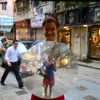

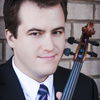
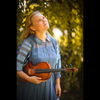

















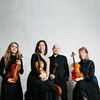
 Continue with Facebook
Continue with Facebook
 Continue with Google
Continue with Google
 Continue with Apple
Continue with Apple
Comments
Comment sections are only for participants.